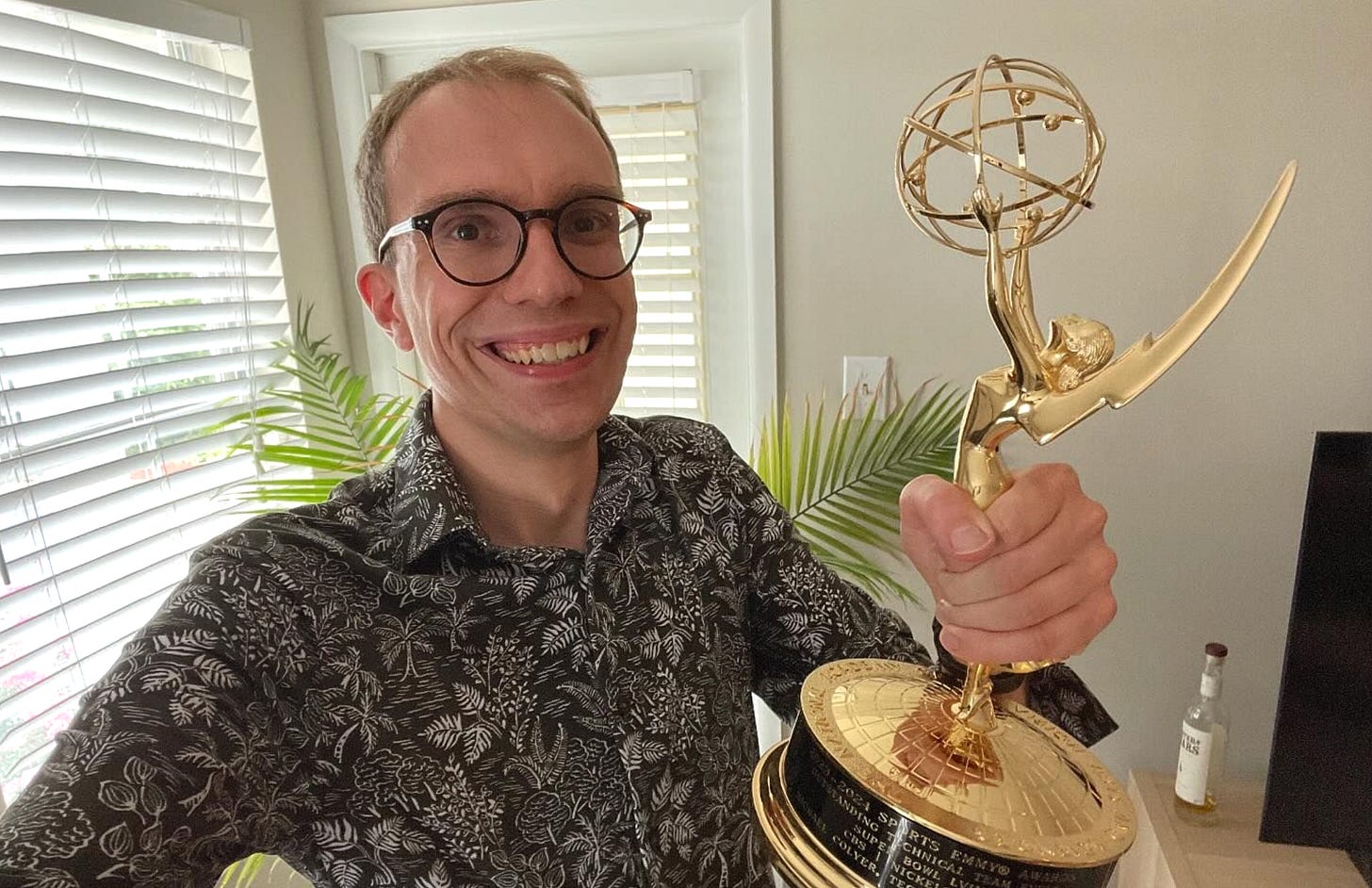“It's way better to destroy a camera, than it is to destroy someone”
What Steven asked Michael Colyer, camera systems designer and Emmy award winner
Micheal Colyer designs cameras for high-profile sports like the NFL, NASCAR, and TV shows like I’m A Celebrity Get Me Out Of Here. Steven caught up with his former student on Zoom as he now lives and works in the United States. They discussed his recent award-winning work on the Super Bowl, making cameras that are literally flexible, and the Brexit challenges to returning and working in the UK.
Where were you born?
I was born in Chatham.
Did you enjoy school?
I did. It was an interesting time where it's hard to know what you are at that age, but towards the back end of my secondary education, I started to discover the media, and at that point, I really found my feet.
What did you specialise in at A-level?
That was when I realised the media was for me. It was Media Studies and a few sciences too, just because it seemed like a good idea to keep that STEM (Science, Technology, English, Maths) core behind me.
Did you have any difficulty with that because you were at a grammar school?
The problem with the grammar school is, and it's that thing that has been shifting more recently, perhaps after my secondary education, where STEM tended to be the primary term back then, where now we're realizing its STEAM (Science, Technology, English, Arts, Maths). So, when you said, ‘Oh, I want to be a media specialist,’ there's a bit of umming and ah-ing where people are going, ‘Well, is that a good idea? Really, wouldn't you rather be an accountant or work in economics?’ So that was a bit odd, but fortunately there was a creative diploma that saw us team up with the local college. That was quite good because that's more vocational media training, but then having the academic background as well was quite a good combination.
How did you find that going from studying at school to studying at college at the same time?
Yeah, that was really interesting because it was a different way of thinking, and I know that the creative media deployment didn't work out, but there is still a lot to be said about combining the two modes of education because it doesn't have to be all of one or all the other. Perhaps the execution of that wasn't brilliant, but that style of learning where you are combining more vocational training with more academic training really would be good to see come back again.
Where did you go to university?
My first degree was at Ravensbourne University, then my Master's programme was at Portsmouth, and I'm currently a PhD at Portsmouth.
What did you study for your first degree?
My first degree, I started studying broadcast operations, which is a more artistic course. About a year in, I realised I'm quite a big fan of technology. I dropped out of that programme and restarted into broadcast technology, which is more engineering. Then, after that, I did my Master's programme degree at Portsmouth University, with my thesis being flexible camera design, by which I mean physically flexible cameras, and my PhD is looking at subjective methods of image quality evaluation by kind of putting image defects into a camera to raise the actual image quality levels.
Let's break some of that down a bit. What do you mean when you say flexible camera design?
Flexible as in literally flexible, as in you can bend it with your hands.
What would be the benefit of bending a camera?
You can install it in places where it may be tricky. Helmet cam is a great example. If you install physically non-flexible circuits onto a camera helmet, it has to go into a casing, and there's a chance that in a crash, that camera could then damage that helmet, which is not a great look, so by having flexible boards you can kind of bend around the helmet a bit better, you can reduce drag, and it usually means soft casings, so if something goes wrong your camera is getting destroyed, but it's way better to destroy a camera than it is to destroy someone. It's a field of technology that I want to see expanded in terms of safety and getting those slightly weirder shots that can't be done with conventional circuit boards.
When did you build your first camera?
That was recently, actually. My secondary training in going to university was technology-focused, but it wasn't the heavy electronics and programming stuff. For 10 years after that point, I worked in TV, just making shows. But as I learned the language of making television, it became apparent to me that the tools I wanted weren't there. There were lots of near enough, like using a screwdriver as a hammer when you're in a bind. I retrained again into electronics, and in the last year, I released for a large broadcasting company my first camera design.
Keep reading with a 7-day free trial
Subscribe to Local Authority to keep reading this post and get 7 days of free access to the full post archives.



